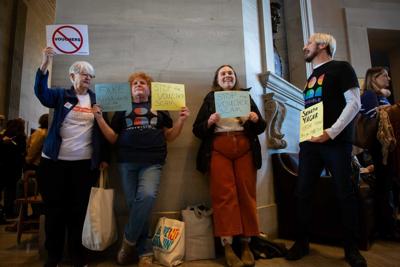Expanding the state’s Education Savings Account system continues to divide otherwise obedient Republican rank-and-file members in the Tennessee legislature. But several key representatives who formerly opposed the so-called school voucher program, which pays families for enrolling children in private school, have softened their stances ahead of a special session called by Gov. Bill Lee to focus on passing ESA legislation. The special session will also focus on immigration and disaster relief money critical to several East Tennessee counties that suffered severe flooding after Hurricane Helene.
Lee faced an embarrassing loss in the spring when disagreement within his own party sank his push to expand ESA reimbursement. Lee has made school voucher expansion a primary political goal in his second term as governor, and this week called a special session starting Jan. 27 to focus the legislature on tweaked voucher legislation. Lawmakers from both parties tell the Scene that Lee wouldn’t risk public humiliation unless he was confident he had the votes.
Sexton and McNally reelected by legislators as speakers of House and Senate; Rules Committee adopts changes along party lines
Within hours of the announcement, seven mayors in East Tennessee released a letter expressing support for Lee’s voucher plan, in many cases going against their own school boards. Several are waiting on disaster relief money for flood damage and represent counties with swing-vote legislators.
“Am I totally in favor of vouchers? No, I don’t think they accomplish the intended purpose,” says Unicoi County Mayor Garland “Bubba” Evely, a signatory on the letter and former school board member. “But there are overall considerations, and I take into account the overall picture to do what’s best for my district.”
Evely still signed on, citing a close-knit community of mayors in northeast Tennessee and the new ESA provision that guarantees that local public schools’ funding levels will not decrease year over year. Evely says he did not receive any “direct communication” from the governor’s office or House Majority Leader William Lamberth (R-Portland), who’s sponsoring the new ESA legislation. As to the Scene’s question about indirect communication, Evely demurred.
Lamberth flatly denies that any coercion is taking place.
Tennessee legislature to also address hurricane relief and immigration during session, set to begin Jan. 27
“There's no connection whatsoever between any education issue or northeast Tennessee relief or hurricane relief or disaster relief or the immigration issues,” Lamberth says. “There's zero truth to that. There have been no conversations of that type.”
Former voucher opponents in East Tennessee have continued to soften their opposition.
First-term Rep. Renea Jones (R-Unicoi), a former school board member who represents parts of Carter and Unicoi County, was a vocal voucher critic on the campaign trail last year. She says she’s open to the governor’s new plan. Speaker Cameron Sexton appointed Jones to the House education committee on Thursday morning.
“I’m listening,” Jones tells the Scene. “I will say, I have had very few letters in support of vouchers. I do think there was an impression given to mayors that vouchers would be tied to flood money. But I think it was an assumption on their part.”
Rep. John Crawford (R-Kingsport) represents Bristol, Kingsport and Sullivan County and was among the House Republicans who opposed various aspects of voucher expansion efforts last year. Crawford tells the Scene he likes the new legislation introduced this year to expand ESAs and can’t make a final decision until he sees whatever bill is filed during the special session. He specifically cites the same element as Evely — funding guarantees for local school districts — as a tweak that has helped win him over.
“ I did have a concern because I was hearing rumors that there was a possibility that the disaster relief funding was going to be tied to the voucher bill,” says Crawford. “Our leadership told me ‘No, that’s not true.’ I have no clue what the county mayors, including those in my district in northeast Tennessee, have been threatened with or not been threatened with. I have always been against vouchers, and I told the governor that in a meeting. But this particular bill, with the ‘hold harmless’ clause in there, gives me protection for my public schools — that they can't lose any money. So now I’m right there in the middle. We've been pumping money into public education for a long time, and in my opinion, what we’re doing is not working.”
Committee chairs and members named in both chambers; House adopts permanent rule changes
School boards continue to raise the alarm on voucher expansion. Kingsport City Schools Board of Education president Melissa Woods directly addressed the “hold harmless” provision as weak protection.
“It doesn’t say for how long,” Woods told the Kingsport Times News this week. “That could be for one year, that could be for 10 years, it is not stated in the legislation.”
Democrats and local education agencies, including school boards beyond East Tennessee, have vocally opposed the expensive reimbursement plan that incentivizes students out of the traditional public school system. Lee’s latest proposal would cost about $150 million for vouchers, $172 million for one-time public school teacher bonuses and $77 million for school building maintenance allocated from taxes on sports betting.
Pairing disaster response with Lee’s controversial voucher push makes perfect sense to Democrats, who readily accuse the governor of turning much-needed flood relief into political leverage.
“To put people in this position, who lost their homes, tells you what kind of person the governor truly is,” says Rep. Bo Mitchell (D-Nashville).
Republican Reps. David Hawk, Rebecca Alexander and Timothy Hill, all potential voucher holdouts who represent flood-damaged areas in East Tennessee, did not respond to the Scene’s request for comment or could not be reached before publication.
Nicolle S. Praino contributed reporting.








